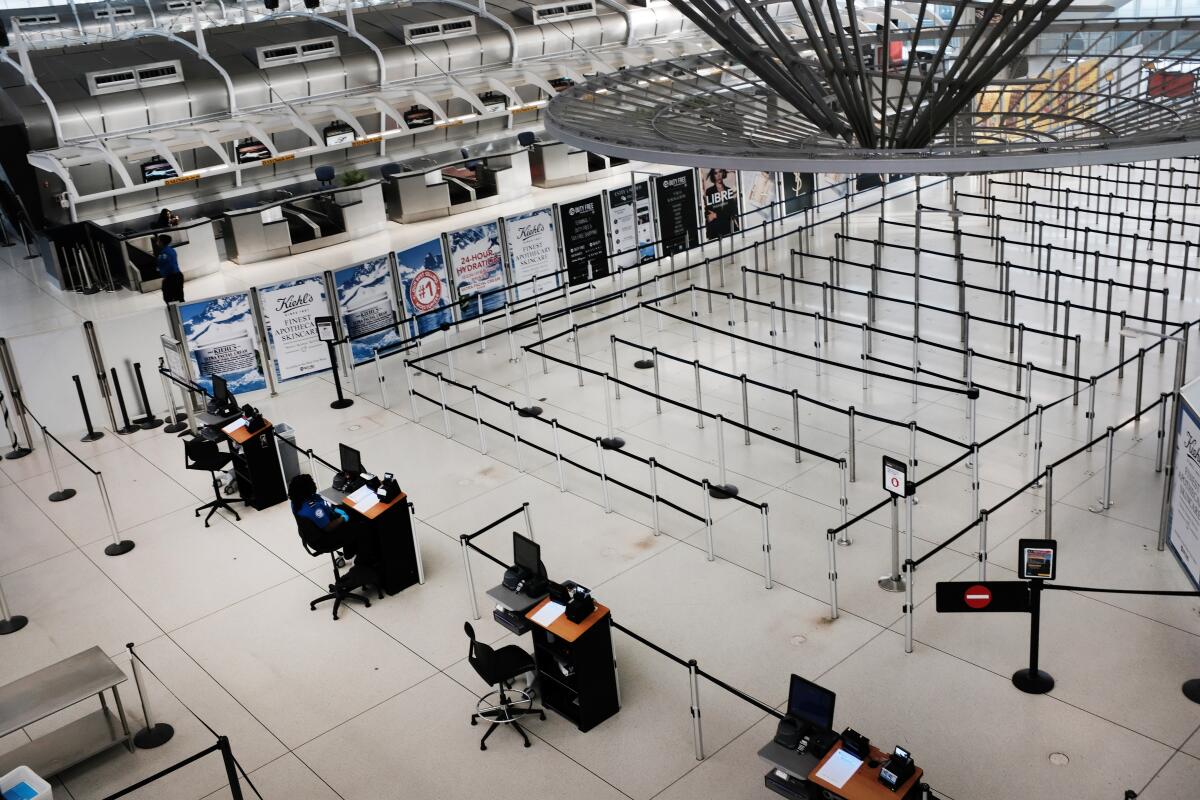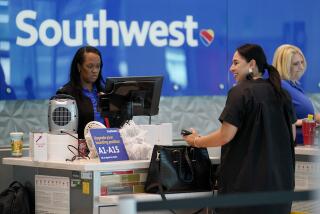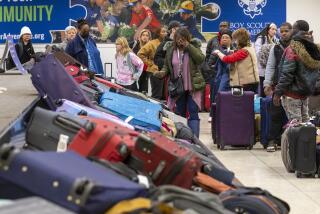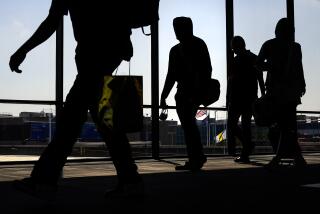Airlines and cruise lines cut service and brace for losses as coronavirus spreads

- Share via
With the coronavirus outbreak prompting new travel restrictions, airlines, cruise lines and other travel businesses scrambled Thursday to soften the financial blow that some industry experts were comparing to what followed the terrorist strikes of Sept. 11, 2001.
Hours after President Trump announced new restrictions on travel between the U.S. and Europe, airlines began discussing with employees ways to reduce their workforces through voluntary buyouts and other options. At least one foreign carrier has announced plans to lay off workers.
“I am concerned that this is more far-reaching than 9/11,” said Lori Bassani, president of the union that represents American Airlines flight attendants. After those attacks two decades ago, flights were halted nationwide for three days. Americans’ reluctance to fly lasted months. The drop in demand resulted in heavy losses to airlines.
Princess Cruises, a subsidiary of Carnival Corp., announced Thursday morning that it was suspending operations for 60 days. The move came after 21 people on its Grand Princess ship tested positive for the virus, triggering delays and quarantines for thousands.
“By taking this bold action of voluntarily pausing the operations of our ships, it is our intention to reassure our loyal guests, team members and global stakeholders of our commitment to the health, safety and well-being of all who sail with us, as well as those who do business with us, and the countries and communities we visit around the world,” Jan Swartz, president of the cruise line, said in a statement.
The Santa Clarita cruise line said it planned to dock all ships on current cruises at the nearest available port and transport passengers home.
Also on Thursday, Viking Cruises said it was suspending operations until May 1. Viking said it was giving passengers up to 24 months to rebook their canceled trips.
After Trump announced the new travel restrictions Wednesday evening, administration officials clarified that the restrictions would not apply to U.S. citizens and their immediate family members, nor permanent U.S. residents. Under the policy, most foreign citizens are banned from entering the United States within 14 days of being in Europe’s passport-free travel zone, known as the Schengen Area.
The new restrictions, which take effect Friday, led to a surge of airline passengers trying to reschedule flights between the U.S. and Europe. The result was hours-long waits on reservation phone lines and social media backlash.
The new travel restrictions would mean cutting nearly 7,000 flights between the U.S. and Europe, with about 2 million seats, in each direction over the next four weeks, according to an estimate from flight data company OAG.
The flight restrictions would affect nearly 11% of all flights from the United States, OAG estimated. Delta and United Airlines would be the hardest hit, accounting for 31% of the affected flights.
Low-cost European carrier Norwegian Airlines announced Thursday that it was cutting 4,000 flights and laying off nearly half its staff.
Earlier in the week, United Airlines reported that domestic bookings had dropped 70% in the last few days and that it was prepared for overall revenues to fall 60% to 70% from April through June.
The world’s airline industry, which had been reporting increased demand over the last decade, could be hit with $113 billion in revenue losses in 2020, with carriers in the U.S. and Canada absorbing about $20 billion of that hit, according to a recent estimate by the International Air Transport Assn., a trade group for the world’s airlines.
“Suspending travel on such a broad scale [as Trump outlined Wednesday] will create negative consequences across the economy,” the trade group’s chief executive, Alexandre de Juniac, said in a statement. “Governments must recognize this” and provide support to the industry, he added.
Sara Nelson, president of the Assn. of Flight Attendants-CWA, which represents 50,000 flight attendants at 20 airlines, called the new restrictions “irresponsible,” saying the move “only creates more confusion and proves this is about politics, not public safety.”
The industry already has been reeling as people choose not to travel for fear of catching and spreading the coronavirus.
“Temporarily shutting off travel from Europe is going to exacerbate the already heavy impact of coronavirus on the travel industry and the 15.7 million Americans whose jobs depend on travel,” said Roger Dow, president of the U.S. Travel Assn. trade group.
Industry experts say U.S. airlines are much better prepared to absorb the losses than they were after the 9/11 attacks, when the drop in demand led some airlines to file for bankruptcy protection.
Thanks to nearly a decade of growing travel demand and relatively cheap jet fuel, U.S. carriers have reduced debt and built up cash reserves, said Henry Harteveldt, an airline analyst with Atmosphere Research Group. And a series of mergers has consolidated the industry to a handful of large, financially stable carriers.
“U.S. airlines are certainly in a better position to navigate their way through this challenge than some foreign airlines,” he said.
The spring break travel season can’t be salvaged, but airline executives and other travel business leaders held out hope that the crisis might be contained in time to take advantage of the peak summer travel season.
Airlines have offered to waive reservation-change fees to let customers rebook new flights up to a year after their ticket purchase. Princess Cruises offered to transfer 100% of the money paid for cruises toward future cruises, plus added credits that can be spent on on-board expenses.
Bassani, the Assn. of Professional Flight Attendants president, said she and American Airlines executives had discussed ways to reduce staffing without laying off flight attendants, such as offering early buyouts to some workers and putting others on three- to six-month unpaid leaves of absence.
“These are unprecedented times for our industry and our union,” she said.
More to Read
Inside the business of entertainment
The Wide Shot brings you news, analysis and insights on everything from streaming wars to production — and what it all means for the future.
You may occasionally receive promotional content from the Los Angeles Times.











